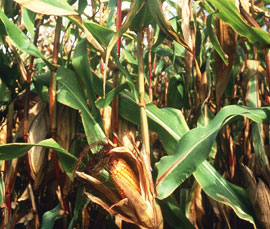DEFRA minister backs use of ‘safe’ GM crops

Farmers in the UK should be able to use genetically-modified crops, provided they can be shown to be safe for health and the environment, according to a DEFRA minister.
Lord de Mauley, the newly appointed parliamentary under secretary of state, said it was important that British farmers were given access to GM crops if the science demonstrated their safety.
Speaking at the launch of a new report into agricultural research priorities, Lord de Mauley said EU legislation was stifling research into GM crops, which are being used widely in the USA and many developing countries.
“These (GM crops) are now widely grown in other parts of the world, but have yet to make a significant breakthrough in Europe,” he said.
“In part, this is due to the unduly slow operation of the EU approval process, that is deterring investment and innovation in this technology. We want the EU regime to operate more effectively, grounded on an objective appraisal of the potential effects of GM crops on human health and the environment.”
He added: “Of course, we must be careful and base safety decisions on science and scientific evidence. But for us, it is important that safe GM products should have access to the EU market and that UK farmers should be able to use this technology where it would help them produce more efficiently and sustainably.”
The government spends about £400m each year on agri-food research. Of this, about half is spent on basic fundamental research, through research councils, to retain our global standing in cutting-edge science.
Lord de Mauley is currently working closely with colleagues in the Department for Business, Innovation and Skills (BIS) on a life sciences agri-tech strategy due to be published early next year.
The strategy aims to support UK economic growth through the development and export of cutting-edge science and technology, as well as the uptake of that technology by the domestic agricultural sector.
“The goal is to improve the competitiveness of UK agriculture through the uptake of ground-breaking new technologies,” he said.
“These include the latest farming equipment and higher-yielding, more resource-efficient crop varieties, such as sugar beet with a high sugar content and new varieties of wheat.”
Wheat scientists and breeders were developing new lines that focused on sustainability traits, such as nutrient use efficiency, drought tolerance and pest and disease resistance, he added.
Lord de Mauley urged the whole of the farming industry to “up its game” and support rural growth by adopting best practice, based on existing technology.
Attracting new entrants to both agri-science and farming and equipping them with the right skills would also be crucial to securing the future of the industry, he said,
“We need a new generation of young scientists who are excited about the career opportunities agricultural science has to offer – and a new generation of farmers who have the skills to make the most of new technologies on farm.
“Ongoing investment by industry and government in agri-science will be key to inspiring that next generation.”
Lord de Mauley was speaking at the launch of a draft strategy report, called Feeding the Future, that highlights critical priorities for the future of food production during the next 20 years.

